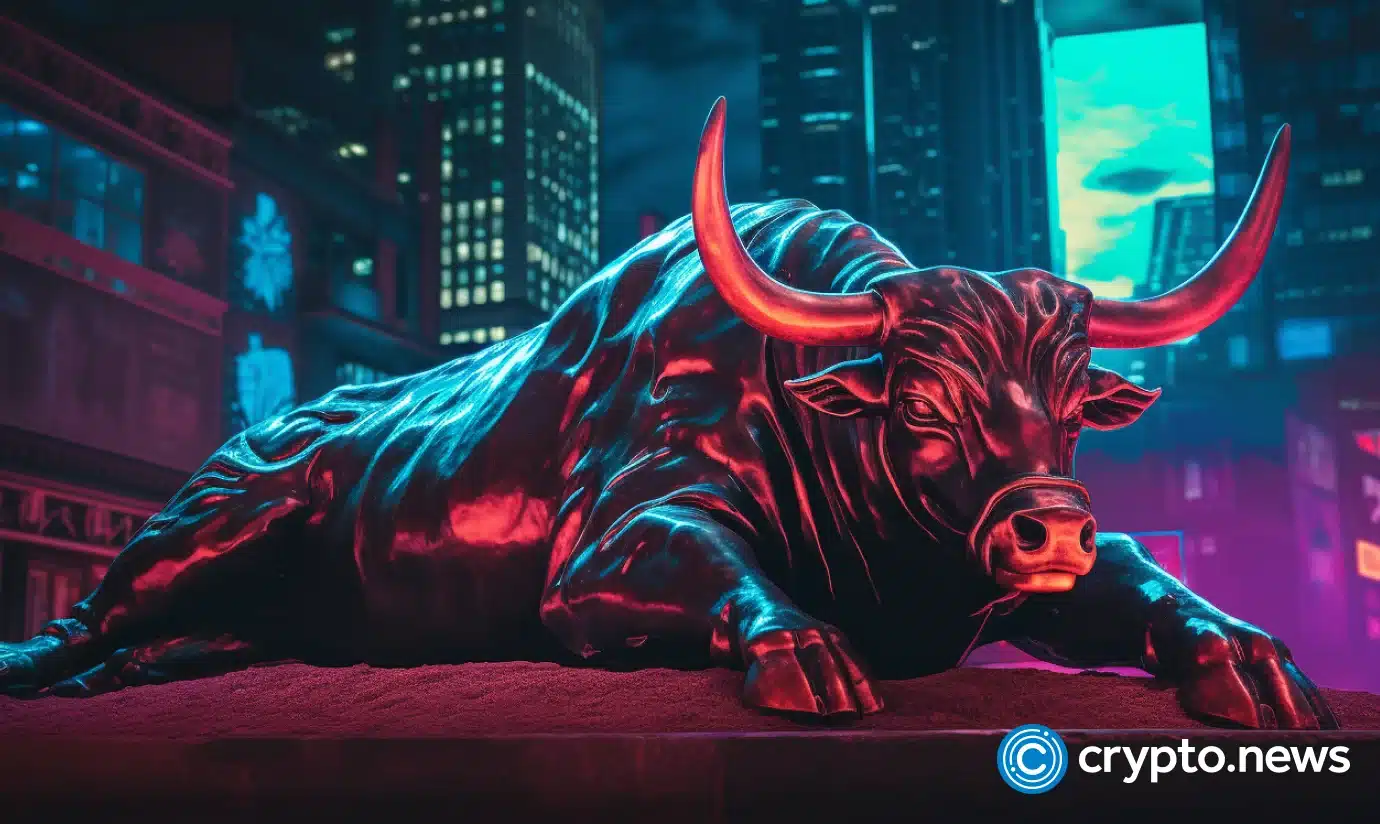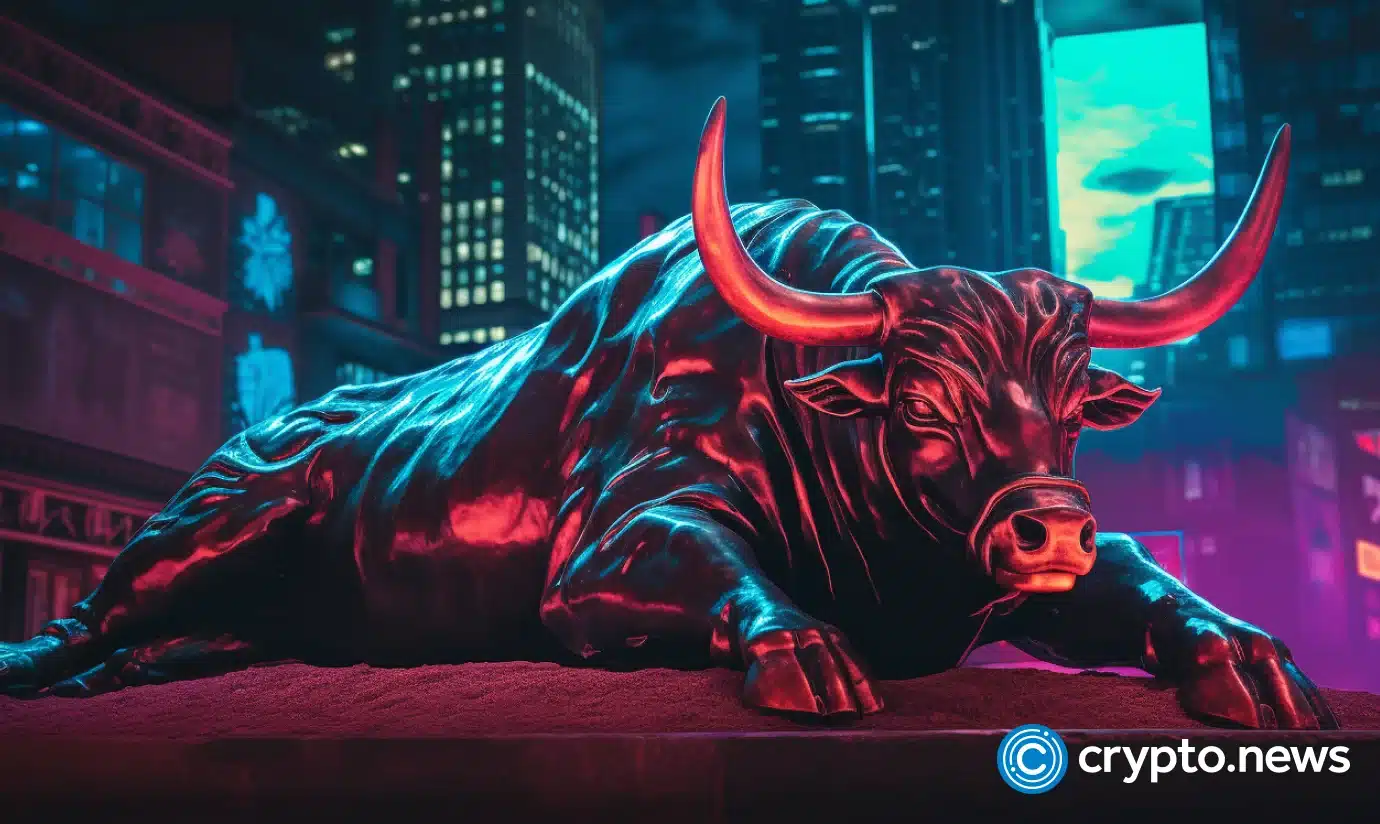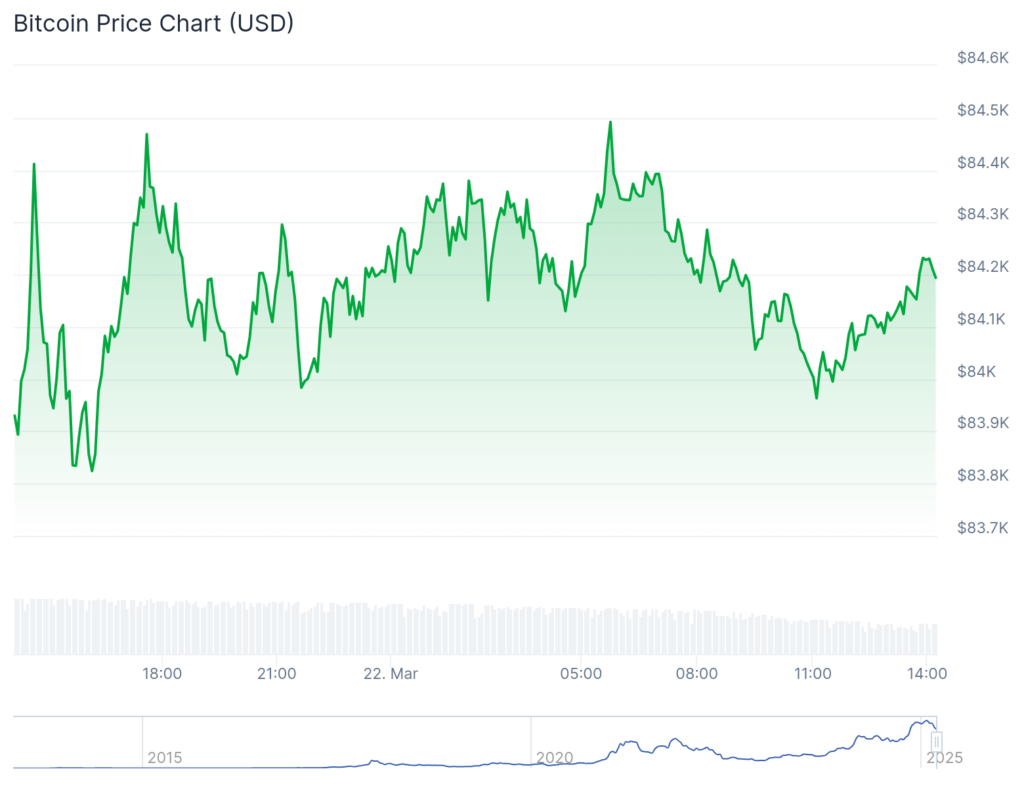Cynthia Lummis
Why Bitcoin dropped following the US BTC reserve launch?
Published
2 months agoon
By
admin

On Mar. 7, 2025, crypto investor and Wolf of All Streets podcast host Scott Melker dedicated a huge part of his Wolf Den newsletter to the meaning of the Bitcoin reserve launch and the public reaction to it. Later that day, he added several statements via his X account, explaining the importance of this historic event.
The U.S. Strategic Bitcoin Reserve creation
Donald Trump promised the launch of the Bitcoin stockpile during his speech in the summer of 2024 at the Nashville Bitcoin conference. Around the same time, Sen. Cynthia Lummis introduced the BTC reserve bill, which suggested that the U.S. should acquire one million bitcoins over five years.
Expectations were high. Crypto X was full of posts with hopes that Trump would sign the Bitcoin reserve creation order right after the inauguration. The reality turned out to be less thrilling as Trump didn’t even mention crypto in his inauguration speech. However, he pardoned Ross Ulbricht of Silk Road, which he promised to do. The Bitcoin reserve plans were confirmed later, and Sen. Lummis joined the Senate Banking Subcommittee on Digital Assets as a chair.
On Mar. 6, the executive order to establish a Bitcoin reserve was signed. The reserve turned out to be different from the one Lummis proposed. Its spirit is much closer to the initial Trump vision of a stockpile made up of the seized bitcoins that the government will not sell. The reserve will be growing via seizures and forfeitures so that it will not use the taxpayers’ money. More than that, the reserve can be increased using other avenues not associated with taxes.
I have a few budget-neutral strategies for acquiring additional bitcoin…
— Michael Saylor
(@saylor) March 7, 2025
Currently, the U.S. is holding around 200k bitcoins. The accurate amount is not clear yet, so the government is conducting an audit. The Digital Assets Stockpile was created on the same date. This one will include other cryptocurrencies, namely ETH, ADA, SOL, and XRP. Some allege there is a possibility for a conflict of interest as White House crypto czar David Sacks may indirectly profit from creating the reserve of these cryptocurrencies. Sacks denies these accusations.
Following the creation of the Bitcoin Reserve, the BTC price dropped by $5,000, while the creation of the Strategic Bitcoin Reserve has always been perceived as a trigger that will let bulls out. Scott Melker explained why the price dropped and why the move was great despite the criticisms.
The price drop explained
Scott Melker decisively associates the price drop with the disappointment from those who were expecting that the Strategic Bitcoin Reserve launch would be followed by buying Bitcoin in large amounts.
The reaction to the Strategic Bitcoin Reserve makes one thing clear:
Most people who claim to be in Bitcoin for the fundamentals really just care about number go up.
The U.S. locking up BTC as a store of value is massive long-term validation—but because it’s not an instant…
— The Wolf Of All Streets (@scottmelker) March 7, 2025
Melker starts his message in the newsletter with “we did it,” calling recognizing Bitcoin as a strategic asset”[America’s] biggest move yet in the Bitcoin game.” From the start, Melker states that other countries will have to follow suit in the Bitcoin race. He stresses that the U.S. will barely tolerate being second after China in terms of the BTC reserve. As of now, the U.S. reserve may be less than the Chinese one. It sets the stage for the global Bitcoin race that will move the price up in the long term.
Further, Melker explains that the difference between the Digital Assets Stockpile and the Strategic Bitcoin Reserve indicates that the U.S. explicitly considers Bitcoin the only cryptocurrency fitting the criteria of a strategic asset worth finding potential acquisition avenues.
“While some critics argue this doesn’t immediately impact the market because the government isn’t actively buying Bitcoin yet, they’re missing the long-term significance. The U.S. just signaled that Bitcoin is here to stay as a key financial asset, and history tells us that when America sets the standard, the rest of the world follows”.
As for the price drop, Melker throws in another factor, saying that when the big news “drops into an illiquid market — leverage flushes out weak hands.” Then, the bigger investors show up, moving the price up. And that’s what actually happened next. The Wolf of All Streets host continues by saying that the global demand for Bitcoin stimulated by the SBR launch will increase the upward pressure in the long term.
Other reactions
There were angry voices across the Internet after the details of the BTC reserve were revealed. Many people were disappointed by the decision not to spend tax money to buy more Bitcoin. Some don’t even see much difference between U.S. Marshalls holding seized bitcoins and the U.S. Treasury holding the same coins in the SBR.
Understandingly, Scott Melker confronted this point of view as it ignores what is written in the order, which doesn’t deny the future budget-neutral BTC acquisitions.
If you think that the Bitcoin SBR is bad news because it will only contain seized bitcoin, then you are bad at reading and worse at comprehending what you are reading.
Sell me your Bitcoin.
— The Wolf Of All Streets (@scottmelker) March 7, 2025
Jeff Park of Bitwise Invest dismissed the executive order, saying there was nothing strategic about it. Park said the entire SBR story turned out to be a major pump-and-dump chapter, and he is happy it’s over.
I’m honestly just glad we can get this pump and dump chapter finally over with and move on to the things that actually matter
Tax policies for crypto capital gains
10y rates
Bitcoin backed stablecoin— Jeff Park (@dgt10011) March 7, 2025
Many Bitcoin bulls praised the move, expressing little to no disappointment, calling the executive order historical. For instance, Senator Lummis voiced her full support for the move despite her project being rejected. The only concern she raised was the lack of congressional support for the Strategic Bitcoin Reserve.
A prominent Bitcoin supporter using the moniker Bitcoin Therapist called the order “the most bullish news [he has] seen in the past four years.”
GM. THE UNITED STATES IS GOING TO BUY BITCOIN. THIS IS A FACT. READ THE FINE PRINT. ANYONE WHO SAYS DIFFERENTLY IS BEING DISINGENUOUS. THIS IS THE MOST BULLISH NEWS I’VE SEEN IN PAST 4 YEARS. THE ENTIRE WORLD IS NOW ON HIGH ALERT. BITCOIN TREASURIES ARE COMING.
— The ₿itcoin Therapist (@TheBTCTherapist) March 7, 2025
Anyways, the U.S. crossed the Rubicon. We’ll see what happens next.
Source link
You may like


This Week in Crypto Games: Ubisoft’s ‘Might & Magic’, ‘Peaky Blinders’ in Development


Why Arbitrum-Nvidia Partnership Collapsed – And What It Means for Web3


Tariff Carnage Starting to Fulfill BTC’s ‘Store of Value’ Promise


The cost of innovation — Regulations are Web3’s greatest asset


Best Crypto to Buy as Derivatives Exchange CME Set to Launch XRP Futures


Metaplanet Buys Additional ¥1.92 Billion Worth Of Bitcoin
24/7 Cryptocurrency News
US Senator Cynthia Lummis Calls Out Fed Crypto Policy Withdrawal, Here’s Why
Published
2 days agoon
April 25, 2025By
admin
US Senator Cynthia Lummis has sharply criticized the Federal Reserve’s recent move to withdraw guidance on cryptocurrency activities. She argued that the decision does not represent genuine progress for the digital asset industry and raised concerns about the ongoing regulatory challenges facing crypto companies.
Lummis, a staunch advocate for cryptocurrency, believes that the Federal Reserve’s actions will continue to stifle innovation and create unnecessary hurdles for businesses in the space.
Cynthia Lummis Concerns Over the Fed’s Crypto Guidance Withdrawal
Senator Cynthia Lummis took to X (formerly Twitter) to express her dissatisfaction with the Federal Reserve’s decision to rescind certain supervisory guidance regarding cryptocurrency activities. She emphasized that despite the Fed’s actions, the core issues facing the crypto industry remain unresolved.
“The Fed withdrawing crypto guidance is just noise, not real progress,” Lummis said. “We are NOT fooled.” According to Lummis, the Fed’s withdrawal of guidance is not a real step forward and fails to address the underlying problems. In a further statement, Lummis said,
“I will continue to hold the Fed accountable until the digital asset industry gets more than a life jacket, Chair Powell—they need a fair shake.”
Cynthia Lummis also criticized the Federal Reserve for undermining the digital asset industry with previous regulatory actions. She pointed out that the Fed’s stance had led to the closure of crypto businesses and hampered innovation. In her view, the Fed’s policies have done significant harm to American interests by preventing the crypto industry from reaching its full potential.
Fed’s Regulatory Approach to Crypto Assets
The decision by the Federal Reserve to withdraw certain supervisory letters represents a new direction in handling of the cryptocurrency industry. These letters had earlier requested banks to obtain prior permission when they intended to undertake activities concerning stablecoins and other cryptocurrencies.
By withdrawing this guidance the Fed follows similar tendencies of other regulators, including the Office of the Comptroller of the Currency (OCC) and the Federal Deposit Insurance Corporation (FDIC) who have also shifted to more lenient approach to banking services related to crypto.
Despite these changes, Caitlin Long, founder of Custodia Bank, like Cynthia Lummis, has raised concerns about the Federal Reserve’s continued stance on digital assets. According to Long, the Fed had not withdrawn its guidelines published back in January 2023 that stated that Bitcoin and other cryptocurrencies remained “unsafe and unsound.”
Cynthia Lummis Criticism of the Fed’s Master Account Policy
Senator Cynthia Lummis also pointed out the negligence of the Federal Reserve in not addressing the concerns of master accounts, allegedly used illegally to limit banking services for crypto enterprises.
The Fed’s noncompliance with the law of master accounts has not been well received by Lummis and other members of the crypto community. In her opinion, this still keeps the crypto companies from being on the same level as normal traditional firms. Master accounts are necessary for banks to receive specific services from the Fed, and Lummis says that this constitutes unequal treatment of crypto.
She appealed to the Federal Reserve to cease employing reputation risk as the guiding principle for crypto activities, and its detrimental effect on innovation. According to Lummis, despite the swearing in of a new US SEC Chair, the Fed is stifling the growth of the crypto industry by not allowing broad access to these accounts.
Kelvin Munene Murithi
Kelvin is a distinguished writer with expertise in crypto and finance, holding a Bachelor’s degree in Actuarial Science. Known for his incisive analysis and insightful content, he possesses a strong command of English and excels in conducting thorough research and delivering timely cryptocurrency market updates.
Disclaimer: The presented content may include the personal opinion of the author and is subject to market condition. Do your market research before investing in cryptocurrencies. The author or the publication does not hold any responsibility for your personal financial loss.
Source link
Bitcoin
Bitcoin race intensifies as leaders address reserve urgency
Published
1 month agoon
March 23, 2025By
admin
On March 20, investor and entrepreneur Anthony Pompliano stated on Fox News, “There’s a global race going on–Russia, Abu Dhabi, El Salvador, Bhutan–all these other countries are trying to buy Bitcoin… the same way that there was a space race there’s now a Bitcoin race.”
The idea of a Bitcoin “race” is now a reality as world leaders actively discuss the urgency of either establishing digital asset reserves or embracing cryptocurrency as legal tender.
El Salvador, in 2021, became the first country to make Bitcoin legal tender, purchasing over 2,000 Bitcoin as part of a national reserve to foster financial inclusion and economic growth. The move has been both celebrated and criticized due to Bitcoin’s volatility. Similarly, in 2022, the Central African Republic became the second country to adopt Bitcoin, viewing the cryptocurrency as a tool to improve economic development and financial inclusion in one of the world’s least developed nations.
Both countries’ actions reflect growing interest in Bitcoin as an alternative financial strategy. It’s hard-capped at 21 million, and in 10 years, most of it will be mined.
The theory is that the countries considering Bitcoin a valuable reserve asset will strive to establish as much ownership of the total BTC supply as possible.
Proponents believe scarcity and growing demand will drive Bitcoin’s value, making large BTC holders influential.
What Saylor says…
One of the most prominent Bitcoin evangelists, Michael Saylor, said that 78% of the U.S. was bought for $40 million at some point. The former CEO of MicroStrategy referred to various land acquisitions, such as the Louisiana Purchase of 1803 to illustrate why the U.S. government should buy Bitcoin now when it’s “cheap.”
In a recent speech, Saylor called the next decade “a digital gold rush” and compared Bitcoin to the Manhattan Project, dubbing it “digital energy.”
“Today, Bitcoin represents the digital capital network, controlling 99% of power within the cryptocurrency ecosystem,” he said. “The U.S. government recognizes only Bitcoin as legitimate digital capital. To secure the future of cyberspace and maintain global financial dominance, America must adopt Bitcoin strategically. Only Bitcoin—and U.S. Treasuries—have the liquidity and global trust required to serve as reliable reserve assets worldwide.”
No wonder Saylor has been vocally supportive of government officials pushing to increase the U.S.’s BTC stockpile.
President Donald Trump, Republican Sen. Cynthia Lummis, and Bo Hines, the Executive Director of the President’s Council of Advisors on Digital Assets, have all expressed a desire to increase the U.S.’s Bitcoin reserve.
Like Saylor, Pompliano (among the most vocal crypto advocates in the U.S.) considers the Trump administration’s focus on Bitcoin dominance important.
Speaking about the future price of Bitcoin, Pompliano said during a Fox News appearance that he doesn’t know when BTC will hit one million. However, he is seemingly confident that, like gold, its value will increase from where it currently is today.
At last check, Bitcoin is trading at just above $84,000.

“I think people are drastically underestimating how maniacal they are going to be about buying Bitcoin,” Pompliano said. “Everyone thinks it’s cute that they put 200,000 Bitcoin over here and now we have this reserve — they are going to continue to buy Bitcoin.”
Who participates in the Bitcoin race?
Apart from the U.S., Pompliano named Russia, El Salvador, Bhutan, and the United Arab Emirates. Indeed, all of these countries reportedly have Bitcoin holdings, but not necessarily all of them explicitly expressed their desire to buy more.
It is not quite clear how much crypto Russia holds. However, it is known that Russia has large-scale mining operations while local companies use crypto for international trade and dodging Western sanctions.
Pompliano neglected to mention several leading Bitcoin holders, including China, which is the second biggest BTC owner after the U.S.
The United Kingdom and Ukraine currently follow China, according to BitBo’s Bitcoin Treasuries page.
All these countries have different strategies:
- North Korea’s hackers steal hundreds of millions of dollars worth of crypto from crypto exchanges.
- The UK holds crypto, seized while dismantling a high-scale money-laundering operation.
- Ukraine became a notable Bitcoin holder through donations made after the intensification of the Russian-Ukrainian conflict in 2022.
- The U.S. intends to confiscate Bitcoin and crypto assets from criminal cases. It’s worth noting that many individual states are exploring the creation of local-level reserves.
More than that, some corporations, most notably Strategy (previously MicroStrategy) and asset manager BlackRock, are among the world’s biggest Bitcoin holders, capable of competing with leading nations in terms of Bitcoin dominance. Both firms own or manage around 500,000 Bitcoins (over 2% of the total supply). As of March 2025, no country holds even half that amount.
Many countries are opting out
European countries have been cautious and innovative in their interactions with blockchain solutions. For instance, Estonia is one of the world’s pioneers in adopting blockchain for elections and healthcare data management. However, the EU countries take a conservative stance when it comes to crypto reserves. High volatility and low liquidity are the main reasons for rejecting Bitcoin’s reserve establishment.
Similar reasons are cited by Switzerland, South Korea, Japan, and other countries that seem unbothered by America’s passion for winning in the Bitcoin musical chairs game. Germany went so far to sell thousands of Bitcoin.
Germany sold all their #Bitcoin at $54,000.
If they had waited, they could have made an extra $990 million.
Losers
pic.twitter.com/2G8iRFhzn9
— Crypto Rover (@rovercrc) November 6, 2024
Crypto.news asked Genius Group, a company using Bitcoin as a corporate reserve, how they time the market.
“As fundamental believers in the long-term potential of Bitcoin, we don’t try to time the market, but rather buy and hold with the intention of never selling,” a spokesperson responded.
Let’s assume the so-called Bitcoin race exists, as Pompliano described it. If we compare it to space or the Manhattan Project, we must ask ourselves: Were the countries that didn’t have spacecraft or atomic weapons in the 20th century left with nothing?
Source link
Bitcoin Policy Institute
US Senator And Congressman Introduce Strategic Bitcoin Reserve Bills To Buy One Million BTC
Published
2 months agoon
March 12, 2025By
admin
Today at the Bitcoin Policy Institute’s “Bitcoin for America” summit in Washington DC, U.S. Senator from Wyoming Cynthia Lummis announced that she is going to reintroduce her strategic Bitcoin reserve legislation in the Senate today.
“I am so pleased to announce that today I will be reintroducing The Bitcoin Act,” Senator Lummis stated. “And I’ll be joined here shortly by Senator Justice of West Virginia, who is one of the cosponsors. And we have several other additional cosponsors. And a lot of it is a result of the excitement that’s been building.”
“So far cosponsors are [Tommy] Tubberville, [Marsha] Blackburn, [Roger] Marshall, [Bernie] Moreno, and [Jim] Justice,” Lummis continued. “We have a couple more feelers out for original cosponsors today but, the House as well through Nick Begich, has six original consponsors.”
Complimentary to Senator Lummis’ Bitcoin act in the Senate, U.S. Congressman Nick Begich announced he will also be introducing the Bitcoin reserve legislation in the House today.
“Today, I will be introducing the Bitcoin Act of 2025 in the United States House,” Congressman Begich said. “This is a bold and forward looking legislative initiative designed to ensure the United States secures its financial independence and maintains its leadership in the global digital economy.”
JUST IN:
US Congressman Nick Begich to introduce Strategic Bitcoin Reserve legislation in the House today to buy 1 million BTC.
The bill already has six co-sponsors
pic.twitter.com/5xJuJ25835
— Bitcoin Magazine (@BitcoinMagazine) March 11, 2025
“The momentum is in our hands and we need to make this happen. Thankfully, President Trump is with us and the opportunities are boundless,” Lummis concluded.
Just last week, President Donald Trump signed an executive order to create a federal strategic Bitcoin reserve. The reserve is to be made up of confiscated bitcoin by the federal government from hacks and seizures, creating an estimated reserve of about 200,000 BTC, pending an official audit. However, this reserve, as it stands, has the potential to be overturned by future presidential administrations. Legislation like the Bitcoin Act of 2025 would solve this potential issue as it would see the United States purchase 200,000 bitcoin per year until it has bought a total of 1,000,000 BTC — to be held for a minimum of 20 years.
$115 billion asset manager VanEck claims that this strategic bitcoin reserve “could help offset national debt”, stating that “if the U.S. government follows the BITCOIN Act’s proposed path – accumulating 1 million BTC by 2029 – our analysis suggests this reserve could offset around $21 trillion of national debt by 2049.”
Source link

This Week in Crypto Games: Ubisoft’s ‘Might & Magic’, ‘Peaky Blinders’ in Development

Why Arbitrum-Nvidia Partnership Collapsed – And What It Means for Web3

Tariff Carnage Starting to Fulfill BTC’s ‘Store of Value’ Promise

The cost of innovation — Regulations are Web3’s greatest asset

Best Crypto to Buy as Derivatives Exchange CME Set to Launch XRP Futures

Metaplanet Buys Additional ¥1.92 Billion Worth Of Bitcoin

Here Are Four Signs the Stock Market Has Bottomed, According to Fundstrat’s Tom Lee

Bitcoin dips below $94,000 as ETFs record $3b weekly inflow

Bitcoin Post-Halving Price Performance Is the Worst on Record. Why?

Expert Predicts Start Date For Pi Network Price Pump

GameFi Tokens Show Signs of Life After Gala Games, White House Tie-Up

Bitcoin trades at ‘40% discount’ as spot BTC ETF buying soars to $3B in one week

Bitcoin Continues To Flow Out Of Major Exchanges — Supply Squeeze Soon?

BlackRock’s Bitcoin ETF Sees $643 Million Inflows

DePIN Altcoin Outpaces Crypto Market and Skyrockets by Nearly 44% Following High-Profile Exchange Listing

Arthur Hayes, Murad’s Prediction For Meme Coins, AI & DeFi Coins For 2025

Expert Sees Bitcoin Dipping To $50K While Bullish Signs Persist

3 Voting Polls Show Why Ripple’s XRP Price Could Hit $10 Soon

Aptos Leverages Chainlink To Enhance Scalability and Data Access

Bitcoin Could Rally to $80,000 on the Eve of US Elections

Crypto’s Big Trump Gamble Is Risky

Sonic Now ‘Golden Standard’ of Layer-2s After Scaling Transactions to 16,000+ per Second, Says Andre Cronje

Institutional Investors Go All In on Crypto as 57% Plan to Boost Allocations as Bull Run Heats Up, Sygnum Survey Reveals

The Future of Bitcoin: Scaling, Institutional Adoption, and Strategic Reserves with Rich Rines

Ripple-SEC Case Ends, But These 3 Rivals Could Jump 500x

Has The Bitcoin Price Already Peaked?

A16z-backed Espresso announces mainnet launch of core product

Xmas Altcoin Rally Insights by BNM Agent I

Blockchain groups challenge new broker reporting rule

I’m Grateful for Trump’s Embrace of Bitcoin
Trending

 24/7 Cryptocurrency News6 months ago
24/7 Cryptocurrency News6 months agoArthur Hayes, Murad’s Prediction For Meme Coins, AI & DeFi Coins For 2025

 Bitcoin3 months ago
Bitcoin3 months agoExpert Sees Bitcoin Dipping To $50K While Bullish Signs Persist

 Ripple Price1 month ago
Ripple Price1 month ago3 Voting Polls Show Why Ripple’s XRP Price Could Hit $10 Soon

 24/7 Cryptocurrency News4 months ago
24/7 Cryptocurrency News4 months agoAptos Leverages Chainlink To Enhance Scalability and Data Access

 Bitcoin6 months ago
Bitcoin6 months agoBitcoin Could Rally to $80,000 on the Eve of US Elections

 Opinion6 months ago
Opinion6 months agoCrypto’s Big Trump Gamble Is Risky

 Altcoins3 months ago
Altcoins3 months agoSonic Now ‘Golden Standard’ of Layer-2s After Scaling Transactions to 16,000+ per Second, Says Andre Cronje

 Bitcoin5 months ago
Bitcoin5 months agoInstitutional Investors Go All In on Crypto as 57% Plan to Boost Allocations as Bull Run Heats Up, Sygnum Survey Reveals




✓ Share: